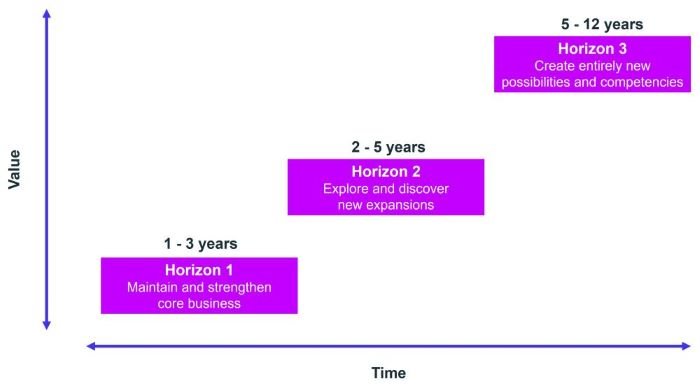on this page
AtkinsRéalis’ Grace Newman considers the perception of innovation in consultancy, and questions if innovation really needs a separate business model – is it more than problem solving?
How innate is innovation to organisations? Is it bound as an internal function, or can partners such as consultancies be seen as the source of innovation? As a consultant, after all, I am not limited by internal bureaucracies, but can act as an agent – fostering evolution through external interventions.
So, what is innovation? The Management Consultancies Association (MCA) refers to innovation as a core competency, framing it as: ‘making change to the established by introducing imaginative, original and new principles, methods or ideas to deliver improvements’. McKinsey’s growth strategy framework further breaks innovation down into three main categories of innovation to best drive growth:
- Efficiency driven (Horizon 1) – one-week, one-month, one-year changes to help organisations find efficiencies in cost, time or resource.
- Continuous improvement (Horizon 2) – medium to long-term changes, with a focus on services, products or processes that already exist but need to evolve to fully meet customer needs.
- Transformative (Horizon 3) – large scale changes that are typically disruptive to business models, markets or processes or could invent an entirely new service.

Figure 1: The three horizons of growth, McKinsey
Arguably, this is more than what we’d think of as problem-solving but, at its heart, innovation is fundamentally about considering how things can be done differently, or evolved to solve organisational challenges. Whether for our own organisational growth or that of our clients, we can therefore reposition innovation simply as ‘problem solving’ – and as highly-skilled problem-solvers, we see the crucial role that consultants can play, in ‘fixing’ or improving something that is broken or not working effectively.
Perceptions of innovation
In my role as a consultant, much of what I do is problem solving. Clients present a challenge and look to me or my team to provide an answer, or to help them find a solution. A growth mindset, innovation and creativity, as outlined in the MCA competency framework, are all foundation values in resolving clients’ issues. As consultants, problem solving plays a clear role in the added value and objective perspective we bring to our clients. Recent MCA research found that consultants are valued by leaders in the private and public sector for the transformational impact, innovation and increased efficiency we offer.
But perceptions of innovation are complex. As I talk to colleagues and clients about innovation I’m met with a myriad of responses, from those as passionate as I am, to those who deny any skill or capacity for innovation. Innovation, I believe, has woven itself a unique industry, through being seen as complex and inaccessible.
Within consultancy over the last few years, we have seen an evolution of the consultancy business model, with large consultancy houses acquiring or introducing start-up subsidiaries that sell ‘innovation as a service’. Whilst this seems to be a successful model, I can’t help but wonder why innovation needs an altogether separate business model, when client problem solving is a skill all consultants should possess.
The role of problem solvers
For clients looking to achieve successful change, rather than branding innovation as a magic bullet, I would challenge organisations to consider how – in its guise as problem-solving – innovation is a core skill that should cut across everything they do. In 2024, problem solving was voted as one of the most in-demand skills by LinkedIn, alongside communication, leadership and team work. So, organisations who want to be innovative must both attract these problem-solving skills (through recruitment or the supply chain) or grow these skills, by upskilling and empowering their workforce.
One key challenge is that organisations talk about a desire for innovation, but they very rarely define what it means to them. By defining the bounds of their business’s innovation or problem solving, leaders can manage their appetite for risk and loosen the ‘reins’ that may currently limit staff engagement. A first step as consultants could be to consider (and challenge) how far our clients are willing to accommodate efficiency driving (Horizon 1), continuous improvement (Horizon 2) and transformation (Horizon 3). Organisations may have specialist innovation functions to foster Horizon 3 innovation; but may be unaware of the role their problem solvers are playing in fixing things and making small but valuable improvements daily, or even hourly.
Equally, 'transformation’ is increasingly branded in client tenders, but as consultants we have a role here to consider their genuine appetite for Horizon 3 innovation versus simple process improvement. This is where I believe we’ll see the value and impact in our roles as consultants evolve, by being both problem solvers and positively challenging our clients to push the boundaries of innovation.
Whether we label it innovation, problem solving or evolution it’s rare for organisations to survive without some form of change taking place. These might be small-scale changes and improvements to address challenges in the immediate term; or they might be longer-term, large-scale solutions to answer problems that are not yet fully understood. What matters is the organisation’s willingness and openness to change and evolve. And as consultants, our role is to help drive the change needed in our clients by delivering the innovation that solves their complex problems. If we can solve problems, we can innovate and if we can innovate, we can affect growth and evolve.
Please note that you are now leaving the AtkinsRéalis website (legal name: AtkinsRéalis Group inc.) and entering a website maintained by a third party (the "External Website") and that you do so at your own risk.
AtkinsRéalis has no control over the External Website, any data or other content contained therein or any additional linked websites. The link to the External Website is provided for convenience purposes only. By clicking "Accept" you acknowledge and agree that AtkinsRéalis is not responsible, and does not accept or assume any responsibility or liability whatsoever for the data protection policy, the content, the data or the technical operation of the External Website and/or any linked websites and that AtkinsRéalis is not liable for the terms and conditions (or terms of use) of the External Website. Further, you acknowledge and agree that you assume all risks resulting from entering and/or using the External Website and/or any linked websites.
BY ENTERING THE EXTERNAL WEBSITE, YOU ALSO ACKNOWLEDGE AND AGREE THAT YOU COMPLETELY AND IRREVOCABLY WAIVE ANY AND ALL RIGHTS AND CLAIMS AGAINST ATKINSRÉALIS, AND RELEASE, DISCHARGE, INDEMNIFY AND HOLD HARMLESS ATKINSRÉALIS, ITS OFFICERS, EMPLOYEES, DIRECTORS AND AGENTS FROM ANY AND ALL LIABILITY INCLUDING BUT NOT LIMITED TO LIABILITY FOR LOSS, DAMAGES, EXPENSES AND COSTS ARISING OUT OF OR IN CONNECTION WITH ENTERING AND/OR USING THE EXTERNAL WEBSITE AND/OR ANY LINKED WEBSITES AND ANY DATA AND/OR CONTENT CONTAINED THEREIN.
Such waiver and release specifically includes, without limitation, any and all rights and claims pertaining to reliance on the data or content of the External Website, or claims pertaining to the processing of personal data, including but not limited to any rights under any applicable data protection statute. You also recognize by clicking “Accept” that the terms of this disclaimer are reasonable.
The information provided by Virtua Research cited herein is provided “as is” and “as available” without warranty of any kind. Use of any Virtua Research data is at a user’s own risk and Virtua Research disclaims any liability for use of the Virtua Research data. Although the information is obtained or compiled from reliable sources Virtua Research neither can nor does guarantee or make any representation or warranty, either express or implied, as to the accuracy, validity, sequence, timeliness, completeness or continued availability of any information or data, including third-party content, made available herein. In no event shall Virtua Research be liable for any decision made or action or inaction taken in reliance on any information or data, including third-party content. Virtua Research further explicitly disclaims, to the fullest extent permitted by applicable law, any warranty of any kind, whether express or implied, including warranties of merchantability, fitness for a particular purpose and non-infringement.
The consensus estimate provided by Virtua Research is based on estimates, forecasts and predictions made by third party financial analysts, as described above. It is not prepared based on information provided by AtkinsRéalis and can only be seen as a consensus view on AtkinsRéalis' possible future results from an outside perspective. AtkinsRéalis has not provided input on these forecasts, except by referring to past publicly disclosed information. AtkinsRéalis does not accept any responsibility for the quality or accuracy of any individual or average of forecasts or estimates. This web page contains forward-looking statements based on current assumptions and forecasts made by third parties. Various known and unknown risks, uncertainties and other factors could lead to material differences between AtkinsRéalis' actual future results, financial situation, development or performance, and the estimates given here.
Downloads
Trade releases


